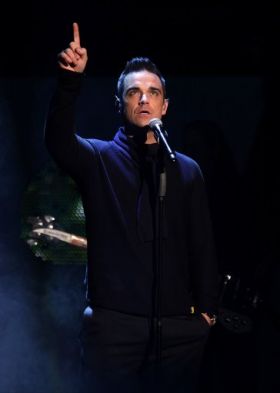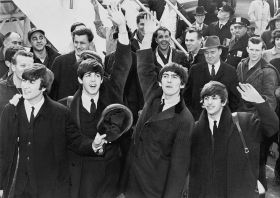Just looking? Five celebs who 'found faith' – and why we shouldn't heap the pressure on them
The 90s British-Indian comedy smash Goodness Gracious Me included a famous character who was obsessed with claiming that all good things came from India. "Shakespeare – he Indian!" "Cliff Richard – he Indian!" He even claimed that Jesus was Indian, since he worked for his father and fed 5,000 people with very small amounts of food.
Christians can often be a bit like Mr 'Everything comes from India'. Many of us – myself included – love claiming that the Church and the Christian faith are at the heart of anything good (schools, the care system, modern healthcare), and we especially love it when we can claim a celebrity for ourselves. The moment that a famous person makes a public comment about Christianity or even just 'God', we're prone to jump on it, tweet it, and hold them up as the next hero of the faith.
The problem is that things don't always work out as we hoped. Like many regular people, some celebrities explore faith, and either decide against it, or embark on a long personal journey toward faith – full of stumbling, setbacks and wrong turns. The trouble is, they do all their journeying – changes of direction included – in the spotlight. The temptation is great for Christians to leap on this news and turn these fledgling believers into heroes of the faith, but in doing so we put unnecessary pressure on them, and create an opportunity for our own disappointment when they don't live the way we think they should.
Here then are five brief stories of celebrities who – in very different ways – have flirted with faith in the public eye. Some continue to pursue God; others are taking a more scenic route. The one thing they share is that at different point in their lives, they've been trumpeted as Christians by eager-beaver believers desperate to encourage others, and themselves, with the 'testimony' of a famous addition to the church.
Jessie J

In 2013, the British singer told the media she was turning her back on her partying lifestyle – and her bisexuality – after finding faith in God. She dedicated her single Thunder to God, telling The Mirror: "I prayed a lot when I worked on this album and it's not something I've ever spoken about openly. But I'm just more confident and feel more comfortable to be open about my beliefs... I thank God every day for my blessings and my talent." She also explained that her touring schedule prevented her from regularly attending church, but gained support from Christian leaders including HTB's Nicky Gumbel, who was delighted to share news of her newfound faith on Twitter.
Jessie's prolific Twitter account continues to include references to faith and prayer, but before Christians rush to expect a worship album from her, be aware that latest single 'Bang Bang' (with the controversial Nicki Minaj) includes some fairly sexualised lines. But... before those same Christians rush to judgement in the other direction, she also told Rolling Stone magazine that she's trying to inject more 'gospel' into her music. In short: she's on a journey.
Robbie Williams

After quitting Take That in 1995, Robbie became Britain's biggest – and most notorious – celebrity male. His partying and womanising ways were legendary, but even in that relatively early stage of his career, he was recording spiritually-uplifting songs such as the karaoke classic Angels and the apparent prayer Better Man. As referenced in his own album title, Williams has lived his life over the last two decades 'through a lens' of media coverage, and over that time he's often returned to the subject of faith. At various points during the noughties, tabloid newspapers repeatedly claimed that he had 'found God', although this never publicly extended beyond the odd out-of-context quote. Then, in 2011, Williams wrote on his blog that he regretted writing the lyrics "Jesus didn't die for you" in his song 'Bodies'. He added: "I haven't found God or anything like that, but she just might have found me."
Marcus Mumford
By all accounts Mumford, the son of Vineyard UK leaders John and Ele, continues to hold a faith, but the obsession with it from Christian and secular fans alike has led him to respond in ways with which some evangelicals have been uncomfortable. There was speculation, for instance, that the inclusion of a very prominent 'f-word' on the band's breakthrough single Little Lion Man was an attempt to ensure they were never labelled a 'Christian band', while in 2013 Mumford – who pens most of the band's spiritually charged lyrics – gave Rolling Stone the headline quote "I wouldn't call myself a Christian". In context, Mumford was actually referring to how loaded labels such as 'evangelical' and 'Christian' can become, and how uncomfortable he was with some of the baggage attached to the label. The article itself points out how wary the singer-songwriter (married to actress Carey Mulligan, who he met at a Christian youth camp) is about talking about this aspect of his life, but there's no doubt faith is important – if private – to him.
Katy Perry

More of a case of a celebrity who lost her faith, American megastar Perry is the daughter of two pastors (Keith and Mary Hudson) and had a fledgling career as a Christian recording artist before her mainstream success. After her brief marriage to British comedian Russell Brand collapsed, Perry denounced all organised religion, but she told Marie Claire that she still believes in "a higher power that's bigger than me". And while she's definitely not defining herself as a Christian, she added: "I still feel like I have a deep connection with God. I pray all the time – for self-control, for humility."
John Lennon
In this excerpt from Steve Turner's The Gospel According to the Beatles, the author claims that before writing some of his more inflammatory and anti-relgious songs, Lennon went through a phase of exploring Christianity. He spent hours in America watching the broadcasts of television evangelists like Pat Robertson and Oral Roberts, the latter of whom entered into lengthy correspondence with him. Then, in the late 1970s, Lennon entered a period of defining himself to friends as a born-again Christian; famously attending church in London on Easter Sunday 1977, and writing several 'Christian' songs, with titles such as Talking with Jesus, and Amen.

In the end, though, Lennon decided his faith was just a phase – according to Turner he had always struggled to accept the divinity of Christ, and was questioned fiercely on the subject by wife Yoko Ono before eventually changing his mind. A few years later, Lennon's position had moved on so much that he reacted angrily to fellow singer Bob Dylan's own Christian conversion, writing the song Serve Yourself in response to Dylan's Christian track Gotta Serve Somebody.
Five very different stories then – all with that glaring media spotlight in common. While parts may be encouraging, surely the key lesson is that we should exercise restraint in rushing to excitement, or judgement about their apparent connections with the Almighty. Faith is a deeply personal and private journey for most of us – for those who are not afforded that luxury, we should pray, not speculate.
Martin Saunders is an author, screenwriter, and the Deputy Chief Executive of Youthscape. Follow him on Twitter @martinsaunders











